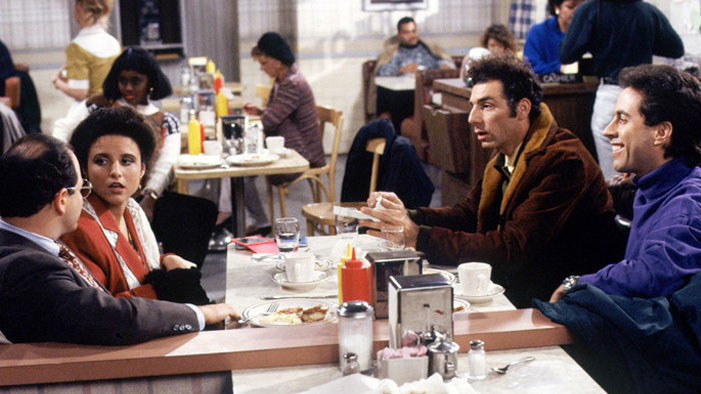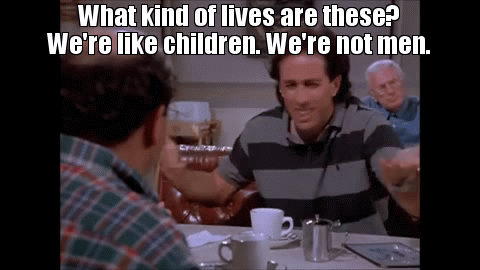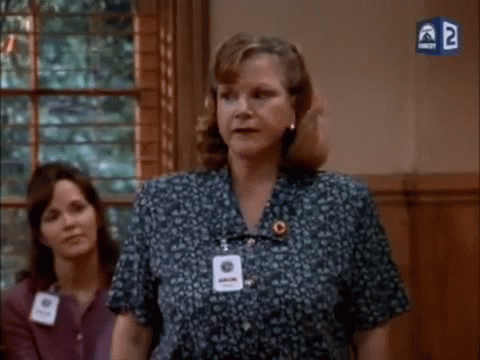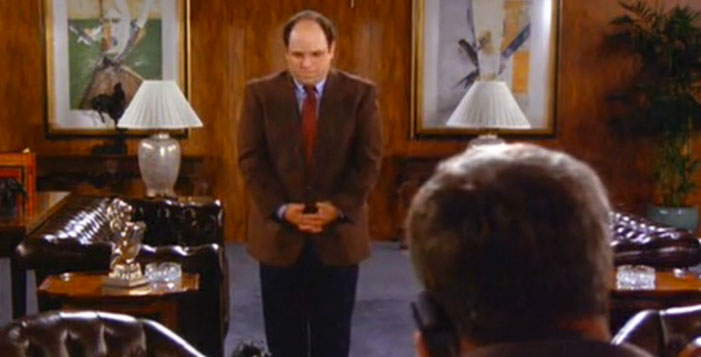To Understand Samuel Beckett and Waiting for Godot, Watch Seinfeld
 It’s a cruel trick of the universe that right when you are in the midst of an existential crisis (i.e., the entirety of your adolescence, ending around age 22), you will be called upon to study the Theater of the Absurd, or Beckett, or both. What even *is* existentialism? You might be wondering. What in bollocks am I supposed to do with Waiting for Godot?
It’s a cruel trick of the universe that right when you are in the midst of an existential crisis (i.e., the entirety of your adolescence, ending around age 22), you will be called upon to study the Theater of the Absurd, or Beckett, or both. What even *is* existentialism? You might be wondering. What in bollocks am I supposed to do with Waiting for Godot?
Fear not, soldiers, I know a way through the mountain…
***
“What even *is* this?” was the general reaction at the premiere of Waiting for Godot in 1956, as fancy theater-goers stumbled about at intermission after an hour watching two men sit on a stage dressed in rags, with a lone tree the only set decoration, bantering back and forth like so:
VLADIMIR: Well, shall we go?
ESTRAGON: Yes, let’s go.
They do not move.
Where theater had always been about the epic, about rises and falls, and deaths and marriages, Beckett purposefully staged a show in which nothing really happens at all. The main characters, Vladimir and Estragon, go through the show diddling about on stage, talking about doing something—leaving, hanging themselves—but always resigning themselves to simply wait longer for “Godot,” who may or may not ever come.
Does it remind you of anything?
JERRY: What do we got?
GEORGE: An idea.
JERRY: What idea?
GEORGE: An idea for the show.
JERRY: I still don’t know what the idea is.
GEORGE: It’s about nothing.
JERRY: Right.
GEORGE: Everybody’s doing something, we’ll do nothing.
Seinfeld wasn’t immediately a mammoth comedy hit. It came onto the air back when comedies were mostly domestic sitcoms like Friends, Full House, and Cheers—hung on two characters who should be together fussing around, waiting to get together until the final episode, or families overcoming small misunderstandings in time for a hug at the end. It was unheard of to take four unlikeable characters and have them do nothing really at all on television.
Setting
ACT I
A country road. A tree.
Evening.

Seinfeld takes place mostly inside Jerry’s apartment or at Tom’s Restaurant, the diner where Jerry, Kramer, Elaine, and George eat cereal and bitch about other people and the world. Like the country road in Waiting for Godot, these places are nowhere. The seasons never change and we are never sure what time it is; the costumes even stay the same. (Jerry’s bicycle hangs on the wall for all eternity, and while the cereal boxes in the kitchen change, they are always in alphabetical order—an ironic sense of “order.”) The only thing we know for sure is that everyone is alive. (Probably.)
Because nothing changes, time has no meaning. As Martin Esslin put it in the intro to Absurd Drama, “Suddenly man sees himself faced with a universe that is both frightening and illogical – in a word, absurd.” Seinfeld and Larry David borrowed this wholesale from Beckett.
Do you have any idea how much time I waste in this apartment? –Kramer
Given so little in the form of a “set,” Vladimir and Estragon have no good way to pass the time, other than to try to end it sooner (Estragon considers hanging himself by his belt, but his belt breaks and his trousers fall down). The characters on Seinfeld engage in “the competition,” and an endless stream of dates, but always wind up back where they began.
Characters
POZZO: (terrifying voice). I am Pozzo! (Silence.) Pozzo! (Silence.) Does that name mean nothing to you? (Silence.) I say does that name mean nothing to you?
Vladimir and Estragon look at each other questioningly.
Vladimir and Estragon have known each other for fifty years, and yet cannot remember what they did the day before, and wonder if they should part ways. Lucky and his master Pozzo enter halfway through the first act, Pozzo riding Lucky like a horse. The second time they appear, Lucky guides Pozzo along, the former now mute, and the latter blind; their roles flipped. They are all tramps, homeless—in short, people who society has rejected.
The Seinfeld foursome are likewise terrible, dumping people for no good reason (“she’s a close talker,” “she’s a low talker,” “he took it out”). At one point, Elaine and George switch fortunes, and Jerry notes, “When you’re up, he’s down. Now he’s up, you’re down,” so you could argue they are facets of the same malignancy, like Lucky and Pozzo. In the final episode, they are sentenced for their failure to assist a man being mugged after a character trial. (They are found lacking in humanity, essentially, but what is a human who lacks humanity? Who even *are* these people?? Why is everything so damn funny?!)

Again, where the greats of drama gave us heroes of consequence like Hamlet and Antigone, Beckett gave us characters with no cosmic importance at all. Seinfeld took it a step further by making his main character a comedian—literally the guy whose job it is to point at the world and laugh—and surrounding him with terrible people whose impotence is near-heroic. Consider:
GEORGE: It became very clear to me sitting out there today that every decision I’ve made in my entire life has been wrong. My life is the complete opposite of everything I want it to be. Every instinct I have, in every aspect of life, be it something to wear, something to eat – it’s all been wrong.
It’s a comment on all of us: What are we doing? What does this all mean? Why do we feel guilty? What should we be doing?!
VLADIMIR: There is man in his entirety, blaming his shoe when his foot is guilty.
Godot
POZZO: (peremptory). Who is Godot?
ESTRAGON: Godot?
POZZO: You took me for Godot.
VLADIMIR: Oh no, Sir, not for an instant, Sir.
POZZO: Who is he?
VLADIMIR: Oh he’s a . . . he’s a kind of acquaintance.
ESTRAGON: Nothing of the kind, we hardly know him.
VLADIMIR: True . . . we don’t know him very well . . . but all the same . . .
ESTRAGON: Personally, I wouldn’t even know him if I saw him.

The most obvious stand-in for the mysterious Mr. Godot is “God,” who has been a metaphysical question mark at least since 1882, when Nietzsche wrote, “God is dead. God remains dead. And we have killed him.” In the modern age, man isn’t sure if a “God” exists, or what form he would take if he did (e.g., an old man with white beard???), and is left to reckon with what it means for him if there is no higher power guiding things. The possibility that we are in charge of our own lives, and that there might be no ultimate meaning, is the *biggestttt concern* of the existentialists. And it’s what makes Waiting for Godot so powerful. Each audience member has to wonder if there is any meaning to the play, if anything will happen in the play. The characters wonder the same thing.
ESTRAGON: Nothing happens. Nobody comes, nobody goes. It’s awful.
In Seinfeld, Jerry is culturally Jewish, but has no religion, really. In “The Junior Mint,” he and Kramer drop a mint into a patient while observing open-bowel surgery, inadvertently saving the man, who doctors say lived due to “an act of God.” In “The Limo,” Jerry and George pretend to be “O’Brien” after seeing a limousine driver holding a sign, so that they can get a ride home from the airport. They have no idea who O’Brien is, but soon discover that he is widely hated, and his arrival has prompted riots in the city. At the Yankees, where George works, real-life figure George Steinbrenner is the all-powerful, all-screaming head, voiced by Larry David but given no face (above!). Again and again in Seinfeld, we look for the person in charge, or the person pulling the strings, and are left with faceless men and a circular trail of clues that leads back to the characters themselves. It’s a perfect refutation of the search for meaning.
Waiting
If the point of the play isn’t rumination on the eternally off-stage Godot, it’s an examination of the perpetual state of waiting. If it’s nihilistic to think that there is no higher power, and no one coming (“Nothing to be done”), the play still dishes up a lesson that if tomorrow might not come and yesterday doesn’t matter, we should make the moment count, rather than wait to be saved.
VLADIMIR: What do they say?
ESTRAGON: They talk about their lives.
VLADIMIR: To have lived is not enough for them.
ESTRAGON: They have to talk about it.
George comes to a similar conclusion in Seinfeld when he decides to marry Susan; alas, she dies while licking cheap wedding envelopes (tragicomedy!) and he is left back where he started.

Okay okay
Absurdism can be summed up by one easyyyy phrase. “What is the deal with ____?”
Jerry’s constant refrain encapsulates everything you need to know about Beckett. It’s a complete lack of certainty around meaning, around purpose, around our place in the universe, around the existence of muffin bottoms. He got that from Beckett!
How much certainty do you feel around your understanding of Samuel Beckett? What else do you want to know?












